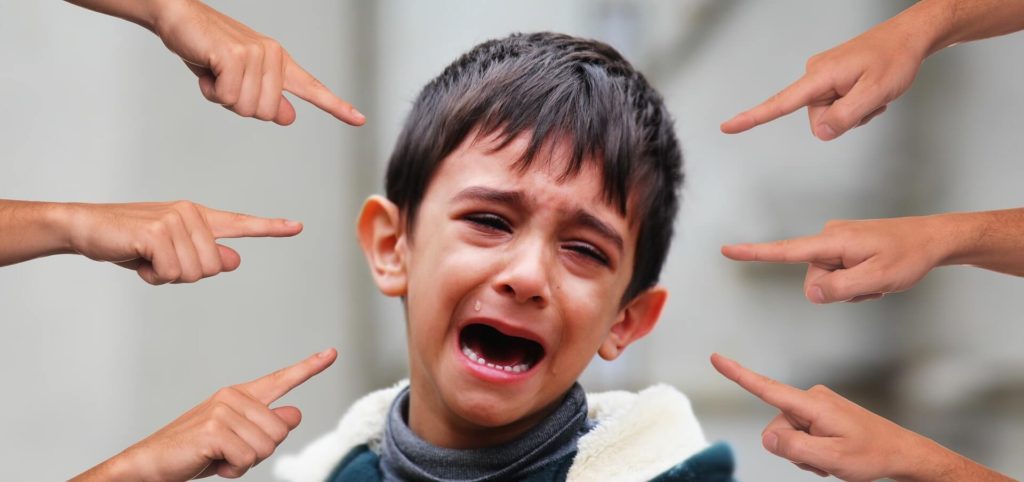Do you feel as if your failures are because of other people holding you back? So you get frustrated. You think it’s unfair because other people are always sabotaging your happiness, and there’s not a damn thing you can do about it.
We’ve all been there. Sometimes life just isn’t fair, and it hurts. But sometimes you have to admit, that it’s not about other people at all, nor is it because you’re just unlucky. You feel this way because you’re not taking accountability for what happens in your life.
There’s a fine line between being a victim and believing you’re a victim. When you make out every situation like you’re an innocent bystander, you’re causing a great deal of harm to your well-being.
So we’re going to look into this devious mentality to look at the core roots of your pain, and what you can do about it.
Understanding the victim mentality: Why it needs to go

The victim mentality is a disempowering mindset where you consistently see yourself as a victim of your circumstances. Because of this outlook, you always feel unfairly treated by others, when this isn’t necessarily the case.
People who have a victim mentality tend to blame external factors for their issues. They shy away from responsibility under the guise that it’s never their fault. No matter what the problem is, it’s someone else’s fault, therefore, someone else must fix it.
Because people with a victim mentality are always pointing the finger, they tend to believe that they have no control over their lives, and their life is the consequence of other people’s actions.
This is the last thing you want to believe if you want to live your best life, because you need to take your life into your own hands. We are all creators, and the experience we have in life is a direct result of what sort of lives we have created for ourselves.
Victim mentality and disempowerment
For most of my life, I’ve been a victim. It’s not because people necessarily gave me a hard time, it’s because I always deferred blame instead of working on myself.
After all, I was miserable. I had some disadvantages growing up, but the problem was not the disadvantages themselves (after all we all have them). I had a problem because I let these disadvantages define me, and blamed everything on them, whether they were related or not.
I was depressed, lonely, and generally a miserable kid growing up. I didn’t know how to be happy, so the best thing I could do was defer blame. It’s much easier to not feel responsible for your failures.
So I blamed the world because I was born into the life I was. I blamed my teachers for not teaching me well. I blamed my parents for not doing a better job at raising me. It was always someone else’s fault which trapped me in this miserable cycle where I wouldn’t change because I never took accountability which creates the right conditions for change to occur.
It wasn’t until I had some major experiences that rattled my life, that I realized my downfall. It wasn’t other people, it was me. After traveling the world for many years and delving deeper into my self-growth journey, that’s when my life took a 180.
Personal accountability is crucial for the personal development process. If you don’t acknowledge that you have a problem, then they’re never going to change your life. This is why the victim mentality is so dangerous because it strips you of accountability which hinders your personal growth.
The root cause of the victim mentality
The victim mentality is a disempowered state where you believe that you have no power over what happens in your life. Due to a lack of self-accountability, people with the victim mentality feel like they’re always the victim of their circumstances when this is far from the truth.
Even though sometimes you will genuinely be a victim, it’s not good to get caught in the mindset that you’re always a victim, for everything. It’s a bit of a stretch.
The victim mentality is a coping mechanism. People who have this mentality often form it through trauma that hasn’t yet been healed. This trauma manifests into self-worthiness issues
Why you should stop being a victim (and why it's possible)

The term victim has become so overused nowadays that many people use it colloquially. There are times when it’s okay to feel victimized because sometimes we are victims.
This feeling helps us know when we’ve been treated poorly, allows us to recognize injustice, and tells us when to stand up for ourselves. But you shouldn’t let this feeling take control of your life, because it degrades your quality of life and makes you generally unhappier.
Self-victimization is when you hold onto the idea that you’re always a victim. It’s a low vibrational outlet that resonates with things like scarcity and misery. When you believe that you are a victim, you can bet that you’re going to attract more shit into your life due to your beliefs, your resulting poor conduct with the world around you, and the negative energetic outlet this feeling produces.
The victimhood mentality is the belief system that you’re not in control of your life, and that you are constantly taken advantage of, in one way or another. When you have this mentality, you are never enough.
It can hinder personal growth and resilience, as it involves a tendency to dwell on negative experiences rather than actively seeking solutions or taking ownership of one’s actions.
The victim mentality is a limiting belief system
The victim mentality is a limiting belief system because it prevents you from taking control of your life.
If you’re a bartender, you will feel shame because you’re not working a respected job. Once you get a corporate job, you won’t be satisfied because you’re just a worker bee. Even if you climb the ranks, there will always be a better company or a better career field where you’re sure you will feel more secure in yourself. But that sense of security never comes, as long as you remain in this harmful mentality.
That’s why you need to work on this mentality and cultivate an outlook where you feel empowered, able, and limitless. When you develop a stronger, better outlook, you will find that you attract fewer negative situations, and the quality of your life improves dramatically.
Victimhood is a low-vibration
Being in a victim state is a low vibrational outlet that attracts more things into your life that resonate at the same frequency. This means that the energy of victimhood is on the same vibration as feelings such as guilt, shame, and resentment.
This means that having a victim mentality can be a painful trap. Because you feel like a victim, you attract more situations into your life where you are the victim. Because of these situations, you feel like more of a victim, and around you go.
This is why it’s crucial to work on this mentality so that you empower yourself to create a better life experience for yourself. When you’re in a high vibrational state, feelings like love, gratitude, and compassion will replace victimhood.
Victims don't learn from their lessons
People who have a victim mentality don’t learn from their lessons. They’re eager to defer blame to other people instead of looking at what they did to create the situation (or the circumstances for the situation to occur).
This means that someone with a victim mentality won’t reflect. Since it’s always someone else’s fault, and that’s out of their control, they’ll believe that there was nothing they could do, learn from, or improve upon. After all, they’re just the innocent victim, they deserve nothing but compassion and justice.
Causes of the victim mentality

Playing the victim as a coping mechanism
People tend to develop the victimhood mentality as a coping mechanism. This mechanism is designed to soften the blow by being submissive and seeking empathy. When people don’t learn how to cope with their environment or life situation in a healthy way, the victimhood mentality is formed.
You haven't healed from a traumatic event
Some people are actually very real victims. If something tragic happens to you and you haven’t healed and overcome the trauma, you might start developing the victimhood mentality. In a sense, the trauma from a particular event leaks into every other aspect of your life, where it becomes hard to draw a line between a harmful mentality and a real situation.
Poor parental and social influence
The people around you have a strong influence over who you become, and what mindsets you develop. If you were bullied in school, this might have degraded your self-esteem and sense of worth. If your parents blamed you for everything that happened when you were around them, you might start to believe it.
Cultural influences and intergenerational trauma
Due to different cultural teachings, people can develop a victimhood mentality because they’re taught to. For example, critical race theory suggests that white people are inherently racist and that we should be ashamed of being white. What does this do? It turns the subjects into victims.
Common signs of the victim mentality

Here are some common signs of people with a victimhood mentality. Scrutinize the list below and identify whether any of the following behaviors, actions, or thought patterns are familiar to you.
If you read through the list and recognize some of these behaviors in yourself, this could indicate that you suffer from the victimhood mentality. Self-awareness is crucial if you want to curb this harmful mentality and replace it with better ones.
- Overdramatization of normal events and situations
- Refuse to take accountability for any failure or wrongdoing
- The belief that everything is out of their control
- Tendency to swap between blame or self-pity, without taking accountability
- They play the martyr (volunteer to suffer when it’s unnecessary)
- They feel sorry for themselves
- Constantly seek sympathy and understanding
- Self-absorption, and the inability to see other people’s problems
- You avoid working on your difficulties or looking for a solution
- Oversensitivity (always look for a reason to be offended)
- Makes others out to be the perpetrator in any situation
- Feeling like they’re constantly being taken advantage of
- General feelings of disempowerment
Stop playing the victim: Practical steps for self accountability

Self-accountability is your road to self-empowerment. It’s easy to point the finger, but that doesn’t get you anywhere does it? That’s why I’ve compiled a list of different actions you can take to help you break free from perpetual victimhood.
Some of these suggestions might sound counterintuitive to you, but I suggest you stick to them until this harmful mentality starts to lose its grip on you.
The more aware you become when you’re slipping into victimhood, the more you can reinforce healthier actions and behaviors to take your power back. With that said, here are some practical suggestions to break free from the victim mentality.
Think critically about the situation
If you have the victimhood mentality, you’re probably going to spin everything in a way that puts you down. If you get into an argument, you might think that you’re being treated unfairly, while there could be a good reason for it.
Likewise, if you’re left out of something, you might think that it’s because nobody likes you, whereas it could be for a genuine reason. This can be tricky because someone with the victimhood mentality will justify these feelings of being mistreated, and may think that it’s their fault.
That’s why it’s important to think critically. Try to discern whether something is a real issue where action needs to be taken, or whether you’re distorting the situation to suit your narrative.
Identify why you're playing the victim
What are you really looking for? Chances are you want compassion and understanding which is completely reasonable. Life has been difficult for you, but nobody seems to acknowledge just how hard you have it.
And let me be honest with you. Maybe they should. Maybe the world would be a little kinder if we actually saw what other people were going through and took the incentive to truly acknowledge them. But you know what?
It’s probably not going to happen.
Most people are so caught up in their own worlds that they don’t open their eyes to others. But you can’t expect them to see what you’re going through, because let’s be honest here, you probably don’t truly see their struggles either.
So instead of making this a game of finding a way to feel acknowledged and heard for the wrongdoings that have been done to you, realize that you’re probably not going to get it. Seeking sympathy is probably just going to make you more resentful, so you need to do the healing yourself and move on.
Understand that life isn't fair, don't take it personally
There are two types of people. People who blame others when things aren’t fair, and those who get on with it.
The fact is life is not fair.
Things are going to happen to you that are out of your control, and sometimes life will suck. But what good does it do playing the victim? Who benefits from blaming, and hoping the situation would be different?
The sooner you accept this truth, the better off you’ll be. Life isn’t fair. If you want to take the road less traveled here, you need to acknowledge that you might just be unlucky. If you’re blaming others, it’s not going to lead to anything good. It’s your karma that causes those uncontrollable circumstances. So accept it and move on.
Take responsibility for everything
If you actually want to empower yourself by getting out of the victim mentality, you need to start taking responsibility for everything. This means that you need to even take responsibility for things that aren’t your fault, objectively, because they’re affecting your life and you’re allowing yourself to be affected.
Shifting blame to responsibility is one thing that will actually make a major difference in your life. When you feel responsible for everything that happens, then you can start making better decisions that lead you down a better road. To learn how to see your life in a way that promotes self-responsibility, read the article below.
Reframe the narrative
To actually break out of the victim mentality, you need to take accountability for everything that happens in your life. You see that people are caught in their own programs, so instead of taking things personally, you realize that it’s from their narrative and not yours.
When you’re unfairly treated or hurt, you go inward instead of reacting. You observe and think about what action comes from your highest self, rather than acting from emotion and impulse.
Ultimately you have a mentality that what happens is supposed to happen. If you were robbed, it was part of your life story. If you end up in a narcissistic relationship, you realize that you made a mistake by trusting the wrong person.
Therefore, being empowered means that you learn from your lessons. If something goes wrong, you think about how it could be avoided next time. If you are taken advantage of, you think about why that happened, and what you could do to make sure it doesn’t happen again.
Learn to stand up for yourself
One behavioral change you can make is to start standing up for yourself. The more you assert your own needs and wants, the less people will take advantage of you.
Every time you feel like you’re being taken advantage of, fall into your gut instinct. If you feel like something is unfair or unjust, it’s probably a valid indicator that you are being taken advantage of, which will make it easier to draw the line.
Recognize when you feel like you’re not being respected, or you’re being stepped on, and reflect on it. After recognizing this feeling, think about what actions need to be taken to get rid of this feeling.
What could you do that would make you feel like you’re being treated with respect? Do you need to say something, assert your boundaries, or leave the situation?
Stop overexaggerating
People with the victimhood mentality tend to exaggerate little things, and stir them up into big issues. You need to stop doing this if you want to stop feeling like a victim. Not everything needs to be an issue, and you need to recognize when you’re turning something into a problem, when it wouldn’t be for other people.
Assert your boundaries
You need to have boundaries in life. It’s not okay when people push their will onto you or blame you for their failings. As someone who is seeking to be more secure in yourself, you need to get the message through to people when they are crossing a line.
This can feel daunting at first, but the more you start drawing and affirming boundaries, the easier it will be to see when someone is crossing a line, or if you’re just perceiving them too. Think of it this way. How will people know when they’re crossing a line if there isn’t a line? The more you assert your boundaries and prevent people from crossing them, the quicker you’re going to feel empowered by drawing boundaries and asserting yourself
Start being grateful for what goes right
One of the best ways to counter the victimhood mentality is to cultivate gratitude for your life. Gratitude is the ultimate trump card for the victim mentality because you cannot be a victim while you’re feeling grateful. They’re polar opposites of vibration.
As the victimhood mentality is associated with scarcity, learning to be grateful for the little things will help you see things in a new light.
To learn more about how to cultivate more gratitude in your life and why it’s so beneficial, click on the link below and we’ll dive right into it!

